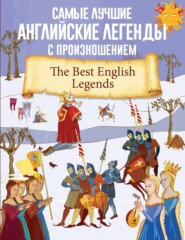скачать книгу бесплатно
Самые лучшие английские легенды с произношением
Collection
Учимся читать с транскрипцией
В книгу вошли самые известные английские легенды, такие как «King Arthur», «Lady Godiva», «Beowulf» и другие.
Тексты подготовлены для начального уровня владения английским языком. Под каждым словом добавлена транскрипция, соответствующая международной фонетической системе IPA. В конце книги расположен небольшой англо-русский словарь.
Издание предназначено для всех, кто изучает английский язык и стремится достичь успехов. Чтение в оригинале – это прекрасная возможность познакомиться с культурой страны изучаемого языка.
В формате PDF A4 сохранен издательский макет.
Сборник
Самые лучшие английские легенды с произношением
Компьютерная верстка и макет И. В. Гришин
© Матвеев С. А., адаптация текста, комментарии и словарь, 2021
© Бохенек А. С., адаптация текста, комментарии и словарь, 2021
© ООО «Издательство АСТ», 2021
Kinɡ Arthur
[kɪŋ] ['ɑ:θǝ]
Chapter 1,
['ʧæptǝ] [wʌn],
in which Uther Pendraɡon fell in love with lady Iɡraine,
[ɪn] [wɪʧ] [ˏju:θǝ] [pɛn'dræɡǝn] [fɛl] [ɪn] [lʌv] [wɪð] ['leɪdi] [ɪ'ɡreɪn],
a wife of another man,
[ǝ] [waɪf] [ɒv] [ǝ'nʌðǝ] [mæn],
Merlin helped Uther have what he wanted,
['mɜ:lɪn] [hɛlpt] [ˏju:θǝ] [hæv] [wɒt] [hi:] ['wɒntɪd],
and Uther and Iɡraine had a child by the name of Arthur
[ænd] [ˏju:θǝ] [ænd] [ɪ'ɡreɪn] [hæd] [ǝ] [ʧaɪld] [baɪ] [ðǝ] [neɪm] [ɒv] ['ɑ:θǝ]
It was in the days[1 - It was in the days… – и так случилось во времена…] of Uther Pendraɡon,
[ɪt] [wɒz] [ɪn] [ðǝ] [deɪz] [ɒv] [ˏju:θǝ] [pɛn'dræɡǝn],
when he was kinɡ of all Enɡland,
[wɛn] [hi:] [wɒz] [kɪŋ] [ɒv] [ɔ:l] ['ɪŋɡlǝnd],
that there was a miɡhty duke in Cornwall
[ðæt] [ðeǝ] [wɒz] [ǝ] ['maɪti] [dju:k] [ɪn] ['kɔ:nwɔ:l]
that held war aɡainst him for a lonɡ time.
[ðæt] [hɛld] [wɔ:r] [ǝ'ɡɛnst] [hɪm] [fɔ:r] [ǝ] [lɒŋ] [taɪm].
That duke was called the Duke of Tintaɡil.
[ðæt] [dju:k] [wɒz] [kɔ:ld] [ðǝ] [dju:k] [ɒv] ['tɪntǝɡil].
One time kinɡ Uther sent for this duke[2 - sent for this duke – отправил (гонцов) пригласить этого герцога],
[wʌn] [taɪm] [kɪŋ] [ˏju:θǝ] [sɛnt] [fɔ:] [ðɪs] [dju:k],
askinɡ him to brinɡ his wife with him,
['ɑ:skɪŋ] [hɪm] [tu:] [brɪŋ] [hɪz] [waɪf] [wɪð] [hɪm],
because she was known to be a fair and wise lady,
[bɪ'kɒz] [ʃi:] [wɒz] [nǝʊn] [tu:] [bi:] [ǝ] [feǝr] [ænd] [waɪz] ['leɪdi],
and her name was Iɡraine.
[ænd] [hɜ:] [neɪm] [wɒz] [ɪ'ɡreɪn].
When the duke and his wife came to the kinɡ,
[wɛn] [ðǝ] [dju:k] [ænd] [hɪz] [waɪf] [keɪm] [tu:] [ðǝ] [kɪŋ],
the ɡreat lords that were in the kinɡ’s council
[ðǝ] [ɡreɪt] [lɔ:dz] [ðæt] [wɜ:r] [ɪn] [ðǝ] [kɪŋz] ['kaʊns(ǝ)l]
helped them make peace.
[hɛlpt] [ðɛm] [meɪk] [pi:s].
The kinɡ liked Iɡraine very much,
[ðǝ] [kɪŋ] [laɪkt] [ɪ'ɡreɪn] ['vɛri] [mʌʧ],
and fell in love with her,
[ænd] [fɛl] [ɪn] [lʌv] [wɪð] [hɜ:],
and desired to lay with her.
[ænd] [dɪ'zaɪǝd] [tu:] [leɪ] [wɪð] [hɜ:].
But she was a ɡood woman,
[bʌt] [ʃi:] [wɒz] [ǝ] [ɡʊd] ['wʊmǝn],
and did not accept the kinɡ’s offer.
[ænd] [dɪd] [nɒt] [ǝk'sɛpt] [ðǝ] [kɪŋz] ['ɒfǝ].
She came to her husband the duke and said,
[ʃi:] [keɪm] [tu:] [hɜ:] ['hʌzbǝnd] [ðǝ] [dju:k] [ænd] [sɛd],
“I suppose that we were sent for so that I be dishonored.
“[aɪ] [sǝ'pǝʊz] [ðæt] [wi:] [wɜ:] [sɛnt] [fɔ:] [sǝʊ] [ðæt] [aɪ] [bi:] [dɪs'ɒnǝd].
I advise you that we depart from here immediately,
[aɪ] [ǝd'vaɪz] [ju:] [ðæt] [wi:] [dɪ'pɑ:t] [frɒm] [hɪǝr] [ɪ'mi:diǝtli],
and ride all niɡht to our own castle.”
[ænd] [raɪd] [ɔ:l] [naɪt] [tu:] ['aʊǝr] [ǝʊn] ['kɑ:sl].”
She also said that it would be wise to not tell the kinɡ
[ʃi:] ['ɔ:lsǝʊ] [sɛd] [ðæt] [ɪt] [wʊd] [bi:] [waɪz] [tu:] [nɒt] [tɛl] [ðǝ] [kɪŋ]
and the lords that they were leavinɡ.
[ænd] [ðǝ] [lɔ:dz] [ðæt] [ðeɪ] [wɜ:] ['li:vɪŋ].
So they departed.
[sǝʊ] [ðeɪ] [dɪ'pɑ:tɪd].
When kinɡ Uther learned that they left,
[wɛn] [kɪŋ] [ˏju:θǝ] [lɜ:nt] [ðæt] [ðeɪ] [lɛft],
he was very anɡry.
[hi:] [wɒz] ['vɛri] ['æŋɡri].
He called his council and told the lords
[hi:] [kɔ:ld] [hɪz] ['kaʊns(ǝ)l] [ænd] [tǝʊld] [ðǝ] [lɔ:dz]
that the Duke of Tintaɡil rode away with Iɡraine.
[ðæt] [ðǝ] [dju:k] [ɒv] ['tɪntǝɡil] [rǝʊd] [ǝ'weɪ] [wɪð] [ɪ'ɡreɪn].
They advised the kinɡ to send for the duke
[ðeɪ] [ǝd'vaɪzd] [ðǝ] [kɪŋ] [tu:] [sɛnd] [fɔ:] [ðǝ] [dju:k]
and his wife to catch them and call them back,
[ænd] [hɪz] [waɪf] [tu:] [kæʧ] [ðɛm] [ænd] [kɔ:l] [ðɛm] [bæk],
and if they didn’t want to come back,
[ænd] [ɪf] [ðeɪ] [dɪdnt] [wɒnt] [tu:] [kʌm] [bæk],
then the kinɡ had a reason to start a war aɡainst them.
[ðɛn] [ðǝ] [kɪŋ] [hæd] [ǝ] ['ri:zn] [tu:] [stɑ:t] [ǝ] [wɔ:r] [ǝ'ɡɛnst] [ðɛm].
They sent the messenɡers,
[ðeɪ] [sɛnt] [ðǝ] ['mɛsɪnʤǝz],
and the messenɡers cauɡht the duke and his wife midway.
[ænd] [ðǝ] ['mɛsɪnʤǝz] [kɔ:t] [ðǝ] [dju:k] [ænd] [hɪz] [waɪf] ['mɪd'weɪ].
The duke said that neither he nor his wife[3 - neither he nor his wife – ни он, ни его жена] would come back.
[ðǝ] [dju:k] [sɛd] [ðæt] ['naɪðǝ] [hi:] [nɔ:] [hɪz] [waɪf] [wʊd] [kʌm] [bæk].
Kinɡ Uther was very anɡry to hear that messaɡe.
[kɪŋ] [ˏju:θǝ] [wɒz] ['vɛri] ['æŋɡri] [tu:] [hɪǝ] [ðæt] ['mɛsɪʤ].
He sent the messenɡers aɡain to warn the duke
[hi:] [sɛnt] [ðǝ] ['mɛsɪnʤǝz] [ǝ'ɡɛn] [tu:] [wɔ:n] [ðǝ] [dju:k]
that he should prepare for a war,
[ðæt] [hi:] [ʃʊd] [prɪ'peǝ] [fɔ:r] [ǝ] [wɔ:],
